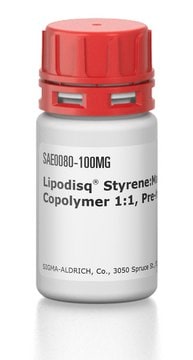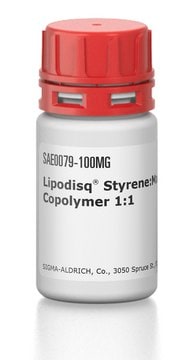SAE0062
Lipodisq®
Styrene:Maleic Anhydride Copolymer 2:1, Pre-hydrolyzed
Sinónimos:
Lipodisq Reagent, Lipodisq Solution
Iniciar sesiónpara Ver la Fijación de precios por contrato y de la organización
About This Item
UNSPSC Code:
12352200
NACRES:
NA.25
Productos recomendados
Quality Level
storage temp.
room temp
General description
Lipodisq nanoparticles are usually made up of styrene maleic acid (SMA) copolymer and phospholipids. It has almost similar structure to that of nanodiscs. Lipodisq nanoparticles are considered as a good membrane mimetic system for the structural studies of membrane proteins.
Application
Lipodisq reagents are novel polymers derived from styrene and maleic acid. Lipodisq polymers are capable of forming nanosized lipid-based discoidal particles capable of incorporating membrane proteins. The Lipodisq technology can solubilize commonly used lipids such as dimyristoylphosphatidylcholine (DMPC) without the use of detergents. Lipodisqs typically have a diameter of 9-10 nm at pH 7.4.
The Lipodisq technology can solubilize commonly used lipids such as dimyristoylphosphatidylcholine (DMPC) without the use of detergents.
Functional pH range: 5.5 - 8.0
The Lipodisq technology can solubilize commonly used lipids such as dimyristoylphosphatidylcholine (DMPC) without the use of detergents.
Functional pH range: 5.5 - 8.0
Biochem/physiol Actions
Lipodisq nanoparticles are considered as a good membrane mimetic system for the structural studies of membrane proteins.
Packaging
100, 500 mg in poly bottle
Legal Information
Lipodisq is a registered trademark of Malvern Cosmeceutics Limited
Storage Class
11 - Combustible Solids
wgk_germany
WGK 3
flash_point_f
Not applicable
flash_point_c
Not applicable
Certificados de análisis (COA)
Busque Certificados de análisis (COA) introduciendo el número de lote del producto. Los números de lote se encuentran en la etiqueta del producto después de las palabras «Lot» o «Batch»
¿Ya tiene este producto?
Encuentre la documentación para los productos que ha comprado recientemente en la Biblioteca de documentos.
Characterization of the structure of lipodisq nanoparticles in the presence of KCNE1 by dynamic light scattering and transmission electron microscopy
Zhang R, et al.
Chemistry and Physics of Lipids, 203, 19-23 (2017)
Characterization of KCNE1 inside lipodisq nanoparticles for EPR spectroscopic studies of membrane proteins
Sahu I D, et al.
The Journal of Physical Chemistry B, 121(21), 5312-5321 (2017)
Lina Zhu et al.
PeerJ, 10, e13381-e13381 (2022-05-10)
Smoothened (SMO) protein is a member of the G protein-coupled receptor (GPCR) family that is involved in the Hedgehog (Hh) signaling pathway. It is a putative target for treating various cancers, including medulloblastoma and basal cell carcinoma (BCC). Characterizing membrane
Juan Francisco Bada Juarez et al.
Biochimica et biophysica acta. Biomembranes, 1862(3), 183152-183152 (2019-12-18)
Dopamine receptors (DRs) are class A G-Protein Coupled Receptors (GPCRs) prevalent in the central nervous system (CNS). These receptors mediate physiological functions ranging from voluntary movement and reward recognition to hormonal regulation and hypertension. Drugs targeting dopaminergic neurotransmission have been
Juan Francisco Bada Juarez et al.
Chemistry and physics of lipids, 221, 167-175 (2019-04-04)
Nanoparticles assembled with poly(styrene-maleic acid) copolymers, identified in the literature as Lipodisq, SMALPs or Native Nanodisc, are routinely used as membrane mimetics to stabilise protein structures in their native conformation. To date, transmembrane proteins of varying complexity (up to 8
Nuestro equipo de científicos tiene experiencia en todas las áreas de investigación: Ciencias de la vida, Ciencia de los materiales, Síntesis química, Cromatografía, Analítica y muchas otras.
Póngase en contacto con el Servicio técnico








